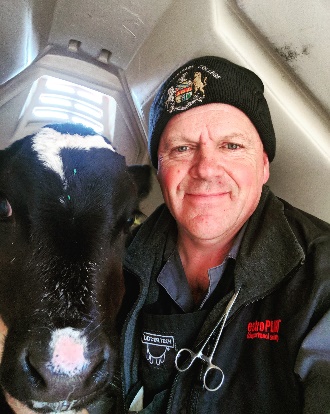Main Content

Name: Jon E. Higgins, VMD
Job Title – Veterinarian and Veterinary Practice Owner
Organization – Acorn Farmvets
Education/Degree Earned – BS from the University of Vermont in Animal Science
VMD – University of Pennsylvania School of Veterinary Medicine
- If you were in 4-H, when and what club(s) were you a part of? How did 4-H help you grow as a professional? – Although I was a Somerset county resident, I worked on a dairy farm in Vermont and the 4-H agent gave me permission to join there – I was a lend-a-calf member in 1974! From 74-78 was part of ‘Hero’s Heifers’ club in South Hero VT – I showed cows at county and state 4-H shows at UVM and other Vermont fairs and the Big E. 4-H helped me very much in learning cattle handling and practical aspects of animal husbandry, as well as team work at shows with other club members. It was healthy and useful to get my share of white ribbons. While blue ribbons were an infrequent but memorable and fun result; the point was- it was all fun! Enjoy the winning moments and learn from the average/mediocre ones.
- What does a typical work day look like for you? (hours, activities, work environment, responsibilities, etc.) A typical day means something happens you never expect – Easter Sunday was three separate emergencies, all different: a ewe with mastitis, a 2 yr old Angus having a backwards calf and a Jersey cow down with likely milk fever. Hours can be long; after all, we work with farmers who have days that are always long, but you get to work outside and spring days are always a treat after the cold and snow of winter. Responsibilities are treating sick/injured animals on farms, but also routine care, vaccination, pregnancy checks and advising/consulting with farmers on protocols for preventative care to help maintain animal health and welfare.
- What is the most enjoyable part of your career? – Getting to work on cows and sheep and all farm species, but more important, getting to work with farmers on a daily basis. While the work is demanding, both physically and sometimes difficult fighting the elements (you need deep tall boots a lot!), it is very satisfying to see the animals helped. Perhaps my favorite call is a ‘dystocia’ (difficult birth) where you end up with a healthy calf, lamb, or kid after correcting a mis-positioned animal – it’s terrific!
- What are some of the challenges you face in your career? – Outbreaks of disease on farm and also helping producers that face economic challenges (esp now with low milk prices) – it’s difficult to have situations with death, loss, or sickness and it’s the veterinarian’s responsibility to recognize, diagnose, and come up with a treatment prevention plan to both help animals and reduce the loss to the farmer.
- What was your favorite science class in school and why? Undergraduate reproduction classes and especially biochemistry. Biochemistry explained a lot, and I found when in medicine classes later how much it underpinned all of that, and having that base of knowledge was a great foundation – loved learning all the compound and enzyme names. Same with reproduction- how the cycles and hormonal feedback loops all played into each other to have a good heat and regular cycles – must be a favorite, because I still love it!
- Can you share advice for youth aspiring to join your profession? (Colleges, majors, internships, tips, tricks, etc.) Work with local farmers and veterinarians, or at least ride along to see if it’s something that you would truly like – perhaps you think you like horses, but realize sheep are even more fun! Or vice versa…having the proper hands on experience is the best. It’s a long commitment doing 4 years of undergraduate degree and then 4 years veterinary medical school, all with (especially these days) high tuition and debt, but it is a very rewarding career. You likely will look forward to each Monday morning starting the week again (even after on call Sundays….).
Which of the following activities can help youth develop the specific skills needed to succeed in your field?
- Public speaking
- Spending time outside in nature (must enjoy working outside, many large animals live in pastures!)
- Staying physically healthy (working with large animals can be very physically challenging)
- Keeping a tidy/organized room (or Vet vehicle)
- Being organized (Vets must be able to keep track of inventory, medicines, and other supplies)
- Taking care of a pet or other large animal (Vets must be animal care knowledge)
- Wildlife or farm animal observation (vets must have a keen sense of what is normal behavior for an animal and what is not)
- Volunteer/work at a farm or veterinary clinic (real life experience handling animals is very important to success!)
By Carol K . Ward, County 4-H Agent, Rutgers Cooperative Extension and Jon E. Higgins, VMD, Acorn Farmvets